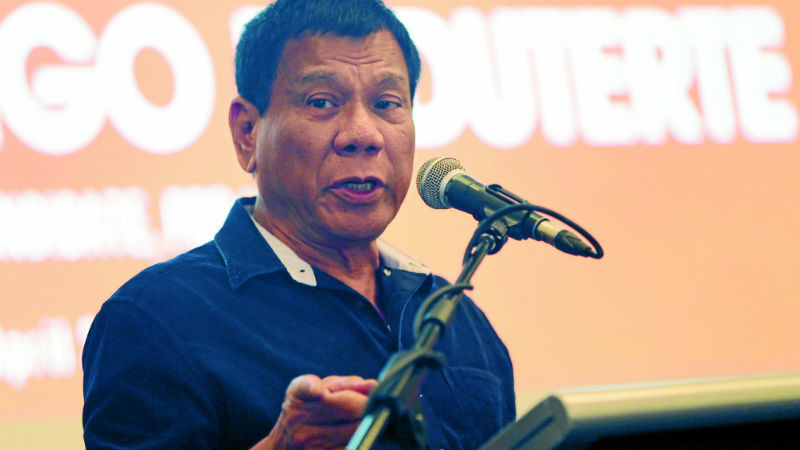Du30’s legal stonewalling
SOME BASIC facts are known and incontestable at this point: Rodrigo Duterte, the presidential candidate who has surged to frontrunner status on a platform of eradicating crime and corruption by any means necessary—“It will be bloody,” he has said more than once—has an account with the Bank of the Philippine Islands branch on Julia Vargas Avenue that was heretofore unknown, until Sen. Antonio Trillanes revealed details about it. Trillanes’ exposé came complete with a breakdown of alleged deposits made on the mayor’s birthday in 2014 that totaled P211 million.
Duterte initially denied the charge, then flip-flopped a day later and confirmed that the account was his. Later he said, on record, that the amount at one time was “a little less” than P211 million, gifted to him by rich friends. But he did not declare it in his statement of assets, liabilities and net worth, as required of every government official, because the money was gone by the time of the SALN filing; he had frittered it all away—“Nag-happy happy ako” was how he put it.
Article continues after this advertisementDuterte’s supporters were quick to label the revelations black propaganda, even if the confirmation of the allegations came from their candidate himself. In subsequent appearances, Duterte would try to fudge the issue by flashing before the throng a supposed statement from BPI certifying that the account’s current balance is only P17,000 or thereabouts. Which, of course, does not answer the original charge: Were there millions at one point in 2014, specifically around the time that he himself said unidentified rich friends of his gifted him with the money, deposited straight into the account?
Certainly, the simplest way to have resolved the issue was to open the account posthaste and show its transaction history. Duterte has characterized himself in the campaign as the simple, incorruptible mayor who brooks no niceties, or even the law when it poses obstacles to what he thinks is the larger good. Per his professed creed, legalism is the refuge of scoundrels—hence the summary execution of petty criminals and drug dependents in Davao without any semblance of due process, something the mayor proudly admits to and is planning to replicate nationwide once he is in Malacañang to restore what he says is a calamitous peace and order situation. Hence his oft-told tale of meeting telecoms officials to complain about slow internet service and, when they hemmed and hawed, threatening to bomb their towers.
Hence the big show of signing a “waiver,” along with his running mate Sen. Alan Peter Cayetano, and calling on all their opponents to likewise make the public commitment “to open all our bank accounts in local and foreign currencies both here and abroad in the interest of transparency and accountability.” (The statement, blown up on a Sintra board, had no legal value—it was a nothing more than a pledge, said veteran lawyer Raul Palabrica—but its aura of no-bull, open-books honesty was clearly designed to further buff Duterte’s image as the cleanest, most truthful candidate around, and therefore most worthy of the people’s vote.)
Article continues after this advertisementNow it appears Duterte’s camp prefers that people forget about that dare of a “waiver.” In the wake of Trillanes’ explosive revelations, it has curiously employed the same pattern of hedging and legalism it had once denounced in, say, Vice President Jejomar Binay’s own handling of the plunder charges against him. On top of his constantly changing statements on the issue, Duterte imposed the legal bottleneck that he would open the account only if Trillanes executed an affidavit stating how he got the bank records, which are protected by the bank secrecy law.
On Monday, at the BPI branch where Trillanes squared off with Duterte’s lawyer Salvador Panelo, Trillanes did just that: He presented an affidavit on the provenance of the records. But no counterpart documents were forthcoming from the mayor’s side. The waiver that Duterte’s lawyer had executed was worded such that the bank said it needed at least seven days to study how to respond to the specific thrust of the request.
Who won in that face-off? Duterte, it would seem. He bought time to keep the information to himself while the country votes on May 9, exactly seven days away. This man who only had contempt for legal stonewalling now seeks refuge in it, while the public to which he has vowed transparency at all times is effectively kept in the dark about a momentous question they suddenly have to grapple with before they cast their vote: Is the mayor as clean as he claims to be?
















